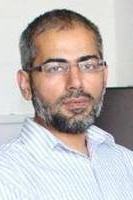Invited-Speakers
Keynote Speaker

Dr Carlos Artemio Coello Coello
Depatment of Computer Science, CINVESTAV-IPN, Mexico
Carlos Artemio Coello Coello received a PhD in Computer Science from Tulane University (USA) in 1996. His research has mainly focused on the design of new multi-objective optimization algorithms based on bio-inspired metaheuristics. He currently has over 500 publications which, according to Google Scholar, report over 55,400 citations (with an h-index of 95). He has received several awards, including the 2012 National Medal of Science in Physics, Mathematics and Natural Sciences from Mexico's presidency and the prestigious 2013 IEEE Kiyo Tomiyasu Award, "for pioneering contributions to single- and multiobjectiveoptimization techniques using bioinspired metaheuristics" and the 2016 The World Academy of Sciences (TWAS) Award in Engineering Sciences. Since January 2011, he is an IEEE Fellow. He is Full Professor with distinction at the Computer Science Department at CINVESTAV-IPN in Mexico City, Mexico.
Speech Title: Recent Research Topics in Evolutionary Multiobjective Optimization: A Personal Perspective
Abstract: Multi-objective optimization refers to solving problems having two or more (often conflicting) objectives at the same time. Such problems are ill-defined and their solution is not a single solution but instead, a set of them, which represent the best possible trade-offs among the objectives. Evolutionary algorithms are particularly suitable for solving multi-objective problems because they are population-based, and require little domain-specific information to conduct the search. Due to these advantages, the development of the so-called multi-objective evolutionary algorithms (MOEAs) has significantly increased in the last 15 years.
In this talk, some research topics that are worth exploring (from the personal perspective of the speaker) in evolutionary multi-objective optimization will be briefly discussed. Such topics include scalability of multi-objective evolutionary algorithms (both in objective and in decision variable space), indicator-based selection, hyper-heuristics, parallelism and scalarizing functions.
In the final part of the talk, some personal thoughts about the future of the field will also be briefly discussed.
Keywords: Evolutionary algorithms, multi-objective optimization, optimization, metaheuristics

Dr. Chun-Hsien Chen
Depatment of School of Mechanical & Aerospace Engineering, Nanyang Technological University, Singapore
Chun-Hsien CHEN is Associate Professor (tenured), Director of the Design Stream, and Professor-in-Charge of the Design & Human Factors Lab in the School of Mechanical & Aerospace Engineering, Nanyang Technological University, Singapore. He received his BS degree in Industrial Design from National Cheng Kung University, Taiwan, MS and Ph.D. degrees in Industrial Engineering from the University of Missouri-Columbia, USA. He has several years of product design & development experience in the industry. His teaching and research interests are in collaborative/human-centric/consumer-oriented product design and development, knowledge engineering, design sciences, engineering informatics and artificial intelligence in product/ engineering design. He has more than 250 publications in these areas. He has been appointed Editor-in-Chief of Advanced Engineering Informatics (ADVEI, Elsevier) since January 2013. He was a Shanghai Eastern Scholar (2011 – 2014), has been a Guest Professor of Tianjin University (since 2013) and Shanghai Maritime University (since 2006), a Visiting Professor of National Cheng Kung University (2011), a Guest Professor of Chaoyang University of Technology (2008 – 2010).
Speech Title: Design for Informatics enabled Human-Centric Smart Product-Service Systems
Abstract: Technology, consumer sophistication and business globalization have led to a highly competitive business environment which demands faster new product (tangible or intangible) introduction and more complex and value-added, customized products. Since the primary role of product design is to bridge users and technological systems in contexts of product use, it is increasingly important to focus on human-centric concerns, such as understanding the users’ behaviour, needs and requirements of different social and cultural segments. As these human-centric factors become more important in product design and development along with increasing complexity from technological advances such as networking and embedded technologies, multi-disciplinary information management becomes critical for achieving high product integrity. Yet, because of the complexity, uncertainty and cross-disciplinary nature of human and societal factors, formal mechanisms for incorporating these factors consistently into the product design and development process have not been well established. In this regard, Smart Product-Service System (Smart PSS) is emerging as an IT-driven value cocreation business strategy by integrating smart, connected products and its generated digitalized and e-services into a single solution to meet individual customer needs in a sustainable manner.
Keywords: Design informatics, Human-centric design, Smart product-service system, Human factors, Product design and development

Prof.Amir Hussain
Edinburgh Napier University, UK
Amir Hussain obtained his BEng (1st Class Honours) and PhD from the University of Strathclyde in Glasgow in 1992 and 1997 respectively. He is founding Director of the Centre of AI and Data Science at Edinburgh Napier University, UK. His research interests are cross-disciplinary and industry-led, aimed at developing cognitive data science and trustworthy AI technologies to engineer smart industrial and healthcare systems of tomorrow. He has (co)authored three international patents and around 500 publications, including over 200 journal papers and 20 Books/monographs. He has led major national and international projects, and supervised over 30 PhD students. He is the founding Chief Editor of Springer's Cognitive Computation journal and Springer Book Series on Socio-Affective Computing. He has been invited Associate Editor/Editorial Board member for various other top journals, including the IEEE Transactions on Neural Networks and Learning Systems, Information Fusion (Elsevier), the IEEE Transactions on Systems, Man and Cybernetics: Systems, and the IEEE Transactions on Emerging Topics in Computational Intelligence. Amongst other distinguished roles, he is a member of the UK Computing Research Committee (national expert panel of the IET and the BCS), General Chair of IEEE WCCI 2020 (the world’s largest IEEE CIS technical event in computational intelligence, comprising IJCNN, IEEE CEC and FUZZ-IEEE), and IEEE UK and Ireland Chapter Chair of the IEEE Industry Applications Society.
Speech Title: Towards cognitively-inspired multi-modal hearing aids and assistive technology: Challenges and Opportunities.
Abstract:Pioneering multi-disciplinary research at Edinburgh Napier University is exploring the potential of cognitively-inspired multimodal processing for engineering secure and smart assistive technologies of tomorrow. On-going research into multi-modal speech perception has led to the development of a novel context-aware, audio-visual speech processing system. The proposed framework exploits cognitively-inspired use of both audio and visual (including lip-tracking) information, and 5G-IoT enabled lightweight encryption and wireless sensing, with applications in next-generation multimodal hearing aids, listening devices and related assistive technology. We present comparative results using real noisy, audio-visual datasets, benchmarked against state-of-the-art audio only, and audio-visual speech enhancement approaches. An overview of related case studies, exploring the role of context-aware multi-modal processing for enhanced sentiment analysis and cognitive load detection, is also presented. Finally, we outline some future research directions and challenges.
Keywords: cognitive computation, assistive technology, cybersecurity, artificial intelligence, sentiment analysis.

Prof. Dr. Jiaxian Zhou
Associate Dean, City University of Macau (FITM)
Research Interests:
Services Management
Tourism Management
Quality Management
Logistic Management
Strategic Management
Professional Certification and Awards:
Chartered Engineer (CEng)
Registered Six Sigma Master Black Belt (MBB)
Certified Hospitality Trainer (CHT)
Certified Hospitality Supervisor (CHS)
The empirical research “Internet + ‘e-commerce demonstration base’ under the new smart city form Zhuhai construction” awarded the third prize of Excellent Paper in the 2016 National Postdoctoral Academic Forum
Awarded “Excellent” rating at performance appraisal in the 2016/2017 academic year
2017-2018 Outstanding Research Recognition
2019 Best Conference Paper Award. Proceedings of the SIBR 2019, Osaka, Japan.
Community Services:
The President of HK Quality Management Association
Subject Specialist of HK Council for Accreditation of an Academic and Vocational Qualifications
Thinking-Tank Research Fellow of ZHUHAI-HONG KONG-MACAO Economic Research Institute of Beijing Normal University
Academic Consultant of Peter Drucker Academy (HK)
Professional Society Membership
Member of the Institution of Engineering and Technology (MIET)
Member of the Hong Kong Institution of Engineers (MHKIE)
Fellow of the Chartered Quality Institute (FCQI)
Fellow of Society of Business Practitioners (FSBP)

Prof. Dr. Robert Hung
Dr. Robert Hung is an expert in Machine Vision and Video Processing, with distinct interest in Human Visual System and Colour Image Processing,
Robert had held Post-Doc and Principal research fellow position, conducted research and development at City, University of London and Kingston University in United Kingdom, also The Chinese University of Hong Kong, The University of Hong Kong and The Hong Kong Polytechnic University, Hong Kong Productivity Council.
Robert was also a core member in several startup companies, and leading the development in Embedded System, Video Processing, Robot Vision, 3D Vision, Wireless Communication and Machine Learning.
Robert is a reviewer of International Journal of Engineering Business Management and IEEE/RSJ International Conference on Intelligent Robots and Systems.
Robert holds several patents related to Machine Vision.
Title:
A journey from traditional machine vision to Deep Neural Network
Robert Hung Machine Vision and Machine Learning Specialist, Nexperia

Dr.Jon Hall
Open University,UK
Dr.Jon Hall is a leading research scientist in computing, requirements engineering, formal methods and problem solving with over 100 scientific publications and extensive experience through the design, management and evaluation of problem solving research programmes in many domains. I have successfully contributed value through my research and scholarship to many organisations, and academic, scientific and leadership committees and boards, and provided business evaluations for many companies.


